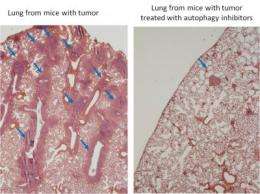Cancer's sweet tooth may be its weak link

Researchers at Albert Einstein College of Medicine of Yeshiva University have discovered that cancer cells tap into a natural recycling system to obtain the energy they need to keep dividing. In a study with potential implications for cancer treatments, Einstein researchers used genetic manipulation to turn off this recycling system within the walls of cells and stop both tumor growth and metastasis (cancer spread). The findings were published in today's online edition of Science Translational Medicine.
Scientists have known that cancer cells require a large amount of energy in the form of glucose (sugar) to support their abnormally rapid growth. But it wasn't clear how cancer cells met those energy needs. The study shows that cancer cells fuel their growth by revving up autophagy, a recycling process that occurs in cell compartments called lysosomes.
During autophagy, which literally means "self-eating," Pac-Man-like lysosomes digest worn-out proteins and other damaged cellular components. "But lysosomes are not merely trash containers," said Ana Maria Cuervo, M.D., Ph.D., the paper's senior author and professor of developmental and molecular biology, of anatomy and structural biology and of medicine. "They are more like little recycling plants in which cellular debris is transformed into energy. Cancer cells seem to have learned how to optimize this system to obtain the energy they need."
Dr. Cuervo and her colleagues detected unusually high levels of chaperone-mediated autophagy, one of the types of autophagy, in cells from more than 40 types of human tumors – but not in healthy tissue surrounding the tumors. (In chaperone-mediated autophagy, small proteins guide debris to the lysosomes for digestion.)
"When we used genetic manipulation to block the activity of this recycling process, the cancer cells stopped dividing and most of them died," Dr. Cuervo said. "We also applied this procedure to tumors in mice, resulting in dramatic tumor shrinkage and almost complete blockage of metastasis."
The researchers believe that selectively blocking this type of autophagy in cancer cells could be a useful strategy for shrinking tumors and halting metastasis. "In future research, we hope to develop drugs that can mimic what we have done using genetic manipulation," said Dr. Cuervo. "We are also exploring using genetic manipulation itself for treating different types of lung cancer."
More information: The paper is titled "Chaperone-mediated autophagy is required for tumor growth."














